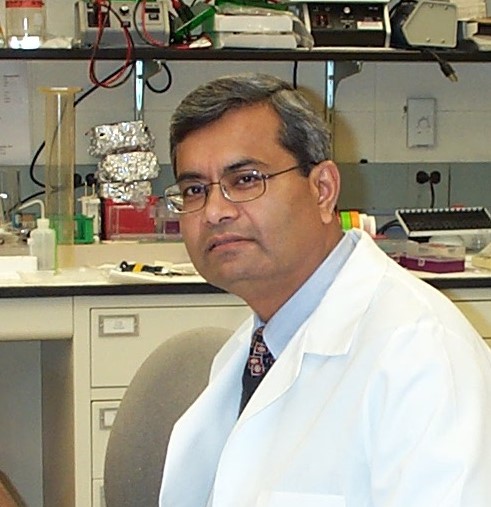The Wayne State University School of Medicine has established the Jena Endowed Distinguished Lecture in Cell Physiology in honor of the pioneering and exemplary scientific and academic contributions of Bhanu Jena, Ph.D., the George E. Palade University Professor and Distinguished Professor of Physiology.
An editorial in the international journal Pancreatology summarizes the impact and contributions of Dr. Jena.
Established with an anonymous gift, the lecture will support expenses associated with scholarly lectures on topics associated with cell physiology in the Department of Physiology.

Dr. Jena’s passion for medicine started humbly in a small town in India, where he learned from his grandfather, who practiced medicine. “The dedication of my father and grandfather to science and medicine and their service to humanity greatly influenced me to choose a career in science,” he said.
With his family’s encouragement, Dr. Jena majored in chemistry, zoology and botany at Buxi Jagabandhu Bidyadhar College in Odisha, India. He went on to study reproductive endocrinology at Utkal University in Bhubaneswar, India, graduating at the top of his class to receive his master’s of science degree with several accolades, including the Utkal University Gold Medal.
Dr. Jena received his doctoral degree in reproductive endocrinology from Iowa State University, and following his postdoctoral training there and at Yale University, he joined Yale as an assistant professor. In that role, Dr. Jena discovered the porosome -- the universal secretory machinery of the cell plasma membrane. He has since determined its structure, composition and its functional workings.
Secretion is a fundamental process through which cells communicate with their environment and exchange information in a multicellular context to reach homeostasis and sustain life. The discovery of the porosome created a paradigm shift in the understanding of the secretory process in cells.
Cell secretion is responsible for numerous activities, including neurotransmission and the release of hormones and digestive enzymes. Secretory defects are responsible for a number of debilitating conditions, including growth defects, diabetes and neurological disorders. Dr. Jena’s discoveries have opened a gateway for the possible development of future treatments and therapies for such disorders.
In addition to the discovery of the porosome, Dr. Jena has greatly contributed to the understanding of the molecular mechanism and regulation of the water channel or aquaporin, the biogenesis of biological membranes, and their fusion, and the development of a new imaging platform of Differential Expansion of Microscopy.
In 2000, Dr. Jena’s accomplishments led him to the Wayne State University School of Medicine. He founded and directs the Institute of NanoBioScience, a strong interdisciplinary program focused in nano sciences and nano medicine. The institute’s overall objective is to prepare U.S.-trained scientists in cutting-edge technologies who can assume the next generation of leadership roles in academics and industry.
Dr. Jena has won numerous awards and honors, including fellow of the American Association for the Advancement of Science; foreign member of the Georgian National Academy of Science; foreign member of the Korean Academy of Science & Technology; foreign member of the Romanian National Academy of Medicine; the Swebelius Cancer Research Award; the Hallim Distinguished Award Lecture, shared with Nobel Laureate Ahmed Zewail; the Sir Aaron Klug Award; the American Society of Animal Science Basic Biological Science Award; the Ranbaxy Basic Research in Medical Sciences Award; the George E. Palade Gold Medal; the European Union Academy of Science; the Academy of Scholars at Wayne State University; six honorary doctorates, including one from Babes-Bolyai University, Romania, shared with Nobel Laureates George Palade and Günter Blobel; the Distinguished Scientist Award from the Society for Experimental Biology and Medicine; and distinguished visiting professorships in a number of institutions globally.
“Throughout my career I have been fortunate to avail the opportunity to learn from great teachers and scholars, and to work with wonderful students and colleagues,” Dr. Jena said. “I look forward to seeing how this lecture series will make a difference in the sharing of information and research in regard to cell physiology.”
To learn more, contact the School of Medicine Office of Development and Alumni Affairs at 313-577-9374 or developmentoffice@med.wayne.edu.